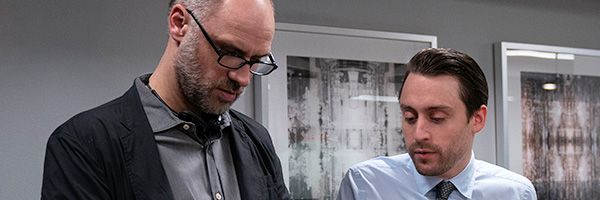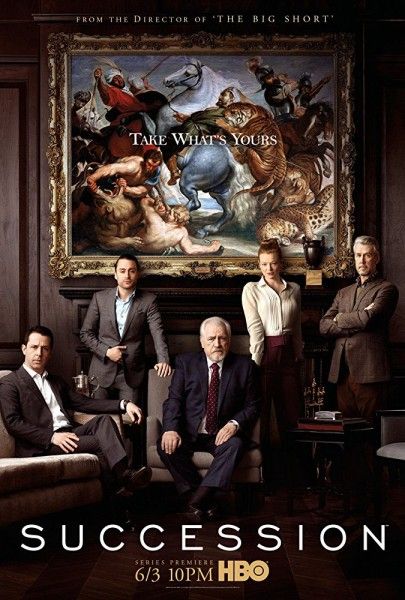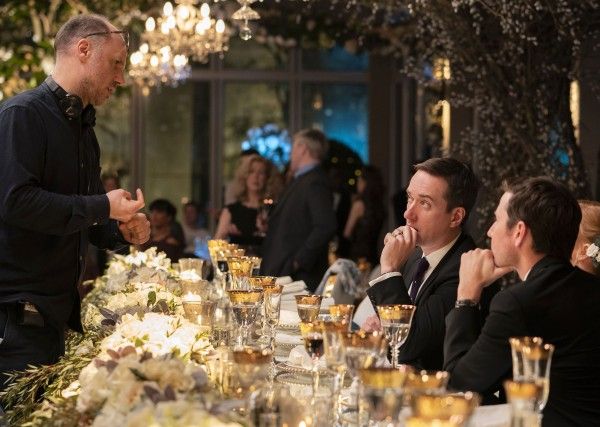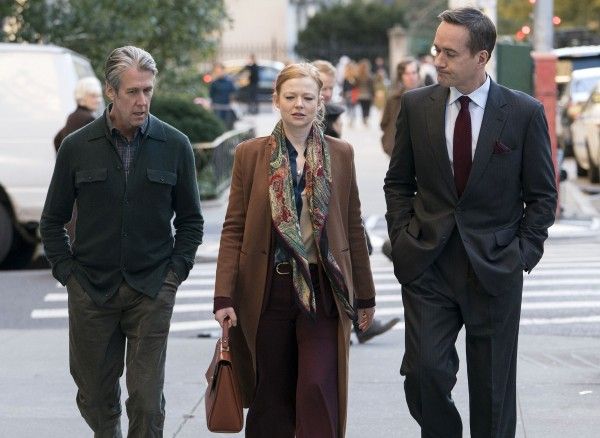Created by Jesse Armstrong (Peep Show), the HBO drama series Succession follows the Roy family – made up of Logan Roy (Brian Cox) and his four children (Alan Ruck, Jeremy Strong, Sarah Snook and Kieran Culkin) – who controls one of the biggest media and entertainment conglomerates in the world. And just when they thought that their aging father would be stepping back from the company, the tough patriarch changes his mind, throwing everything into upheaval and forcing the family to choose sides.
During this 1-on-1 phone interview with Collider, showrunner Jesse Armstrong talked about how he found out about the Season 2 pick-up for the series, the great sense of freedom they have at HBO, being excited by the opportunities for storytelling that the second season will provide, telling a story about family and power, finding the show’s tone, the fun of shooting the big family scenes, whether he’d consider directing an episode himself, and whether the Roy children are loyal to anyone but themselves. Be aware that some spoilers are discussed.
Collider: First of all, congratulations on Season 2! A renewal after airing only two episodes seems like a really big deal.
JESSE ARMSTRONG: Yeah, it’s exciting!
When and how did you find out that you’d get to keep telling this family story for a bit longer?
ARMSTRONG: You get vibes when you’re doing a show. The network are nice and I’m friendly with them, so you start having little conversations about, “What if . . .” So, I had positive vibes. And then, we did a screening in New York and Casey Bloys and Richard Plepler were there and they gave me a little bit of a nod, a few days ahead of time. They said, “Look, we think we’ll do it again.” It’s very tiring and time-consuming, so there’s even a little bit of “Fuck, I’m pretty pleased with the series, I wonder if we can do that again. It’s going to take a lot of time.” But obviously, I am very pleased that we get the chance to do more for them ‘cause I think there are more good stories to come.
When you were working on the first season and figuring out the story you wanted to tell, did you also have an idea of what a second season might look like, and did making a season of this show change the story you might want to tell going forward, in any way?
ARMSTRONG: Yeah. The writers I work with are brilliant, so I have a sense of what I think the story will be, but the first thing I’ll say is, “Let’s try and beat that,” or “Maybe I’m wrong.” I think it’s really good to have a sense of freedom, which we’re lucky enough to have at HBO. It’s about, what do we really want to write about?
With the way that you leave things, at the end of the season, it seems like Season 2 could go just about anywhere with all of the characters. Does that feel exciting, or is it nerve-wracking and scary to be able to possibly take them anywhere you want?
ARMSTRONG: As a writer, the blank sheet of paper is terrifying, but this is the good version of the blank piece of paper because there’s a lot of room to maneuver. On the other hand, we know who they all are now, so it honestly feels like a good place. It feels like that point where you’re excited by the opportunities, but not overwhelmed by the range of opportunities.
I know that you had written a screenplay about the Murdoch family that never ended up getting made, and you’ve said that that was the origin of thinking about these types of media families. Do you think this show would have existed eventually, even without that script, or does this series feel like it really only exists because you wrote that other script?
ARMSTRONG: That’s a really good question. I don’t know. Honestly, I think it definitely could have happened. Somebody else suggested the area, as an area to write about, and I am drawn to writing about power. I worked in politics, and I grew up far away from any centers of power or influence. I was always intrigued about how the hell the world came to be like it is. So, I ended up doing comedy and sitcoms, with The Thick of It and Veep, and ended up writing about politics. I think the media and media ownership, the influence of individual consciousnesses and political viewpoints of individuals, and the way that that has shaped the world, is something that anyone who’s thinking about power now and how the world has ended up in the shape it is, in this political climate, I might have come to writing something in this area anyway. There are a million things to write about, but I think this is very much in my area of interest.
It’s interesting how, with all of the power, the politics and the money of this story, that it still feels, at its core, like a family drama. Do you think of this series as a family drama, above all else?
ARMSTRONG: I feel like it’s really true that both parts are important and essential to the show. When I was kidding around, I would sometimes pitch it to people as Celebration, the Danish movie, meets Dallas, with the business element and the family element, and that quite brutal, satirical treatment of a family. I wouldn’t have wanted to just do a boardroom, Margin Call piece about these people, without that family core. I was really interested in the Redstones, the Mercers, the Murdochs, and these families where you have a name branded on your forehead when you enter any room, in the same way that people who are born into monarchies have. You can never get away from it. You could never do anything ‘cause, if you were Shari Redstone, what can you do in life that’s going to surpass your name? So, I loved the family element and I loved the business element. They come together really well for me.
How invested do you get, personally, in these characters? Do you find yourself rooting for any of them, in particular, or are you drawn to any one of them?
ARMSTRONG: As a showrunner, you have to maintain a certain parental equality towards all the people you’re dealing with. I feel like you have to not get too involved with anyone. We’ve got a lot of comedy writers in the writers room, and even the ones who aren’t out and out comedy writers have the facility for comedy. We talk about, would it be funny or interesting, if this happened to a character? Often, what you’re thinking is quite bad and there’s a part of you that laughs at the awfulness, but it’s also like laughing when a friend tells you, “You won’t believe what happened at the wedding that I went to this weekend. It was so awful.” It’s not an uncharitable, horrible, let’s take our characters to the torture chamber feeling, but it’s a human, this is going to be so awful when this happens feeling. That’s the kind of feeling I have towards them.
This show does have some funny moments, but it’s quite dark and dramatic, and a bit darker and more dramatic than some of the things that you’re known for having done. When you were going through the casting process for this, did you get a lot of questions from actors, especially when it came to what tone you had in mind for this show?
ARMSTRONG: That’s a really interesting question, but interestingly, I don’t think I ever had that conversation with the actors. I’m really proud of the writers’ room, and I’m really proud of the cast. I think they’re extraordinary. They all have the facility for giving a very real performance, which sometimes allows for comedy, as well. We discussed lots of things on set, but with the tone of it, I don’t think it was ever a thing where we said, “Hey, Kieran [Culkin], this needs to be funny and sad, at the same time.” That’s just what he does. Brian [Cox], Jeremy [Strong] and Sarah [Snook] are tremendous. In the pilot, that scene where Brian is standing next to [Nicholas Braun] silently in the elevator, going up to the family lunch, he can mine a laugh or a comic response from an audience with no words at all and very little facial movement, which is extraordinary. When we’re in the writers’ room, sometimes you feel like a motoring enthusiast, which none of us are, who’s just been taken into a garage and offered the most incredible fleet of Formula One racing cars to drive around. They’re a dream to write for. They can do pretty much anything, anywhere you suggest going, and they can make it true.
One of the things I really love on this show are the big family scenes and getting to see how all of these people play off each other, but those scenes are challenging and you have quite a few of them, throughout the season. What are those sequences like to shoot?
ARMSTRONG: A certain amount of ignorance on the part of writers is quite good. I remember seeing Andrij [Parekh], who directed Episode 6, which is the big boardroom scene, and Adam Arkin, who directed the Thanksgiving dinner and the charity ball, and there was a certain sense of anxiety because there was a lot to do. Adam McKay, who did the pilot, set a good template. We often shot with two cameras and people didn’t necessarily know what was getting shot when. There was an improvisational element, so conversations would keep going off script. It was not un-challenging to get those big pieces, but we have good format for achieving them. They’re fun. It’s a bit like being in a play, and I think the actors quite enjoyed that.
You talked about how great the writers are that you have, and we’ve also talked about how tremendous this cast is, but you also had some pretty great directors this season. Have you thought about the directors that you’d like to get on board for Season 2, and could you see yourself directing an episode?
ARMSTRONG: I haven’t got a wishlist of people to get on board, as yet. I’ve directed some shorts. I would consider directing. There’s usually so much work to be done. We rewrite quite late and we offer alternative lines, so it would probably be unwise to direct one, but I wouldn’t rule it out.
This is a great group of people, all the way around, and you can really see that in the material. This is really just such a smart, challenging, adult show, and you can feel that that comes from all sides of the production.
ARMSTRONG: I’m really, really pleased you feel that way ‘cause it did feel like that. We had a good time making it. From the pilot with Adam McKay, we all knew we were making the same show. You’ve probably heard about when collaborations go wrong. Sometimes you only need a little bit of a difference of opinion and things can start shifting, but Adam knew the right style for it and my writing fit that well. We had a cast who hit that, and then the subsequent directors were brought on board for it. I felt very good about it.
When it comes to the Roy children, are any of them loyal to anyone but themselves?
ARMSTRONG: Oh, that’s a good question. They behave badly and they’re tough people. They have a bit of that Fitzgerald-ian carelessness about them that rich people can have, but they’re very much products of their upbringing and their environment. I have that degree of empathy with anyone. I don’t believe in evil. I believe that people are products of what they’re brought up amongst. I have that level of compassion for them. I don’t think they’re unredeemable or incapable of putting other people ahead of themselves. They’ve just had a very, very tough schooling in not doing that.
It’s interesting to see someone like Greg (Nicholas Braun) show up and react and adapt to this family and their behavior. He’s already been manipulated by them more than once, and he’s started to figure out how to leverage things for his own gain. By the end of the season, would you say that he’s officially become a Roy, or is he just the seedling of a Roy?
ARMSTRONG: He turns up in the pilot with the outlines of an offer that he thinks he might be able to make, so he’s always had a bit of cunning about him, but there are layers and depths to the potential nature of betrayal, that he hasn’t plumbed yet. I think he’s still in the shallows, compared to those around him.
Succession airs on Sunday nights on HBO.





